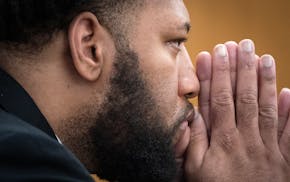Minnesota Gov. Tim Walz says he's told state agencies to start planning as if all of their federal funding will be cut.
"They're happening so fast and without any lead into it," Walz said. "I'm telling my team to assume, if you've got a federal grant for a critical program, to assume it's being cut and start planning for different scenarios."
Walz's comment came one day after the state Department of Health laid off 170 employees and rescinded job offers for nearly 20 others. The jobs were connected to more than $220 million in federal grants that were canceled by the Trump administration.
The Health Department said an estimated 300 layoff, separation or "at risk" notices were sent to employees this week.
"I think they're just getting warmed up," Walz said of the Trump administration Wednesday after meeting with legislative leaders. "I fully expect, as they continue to flout the rule of law, there will be cuts in areas that we are required to provide services to."
The Trump administration last week announced $11 billion in cuts to federal public health grants involving COVID-19, though many of the grants funded broader public health efforts. Led by Minnesota Attorney General Keith Ellison, a coalition of state attorneys general has sued to overturn the cuts, and a federal judge ruled Friday to temporarily block the move.
Brooke Cunningham, commissioner of the state health department, said the ruling was a "bright spot amidst what have been some very dark days in public health," but said the "future is not yet certain."
"We will once again have to take some time to figure out what this fully means for the critical services we provide, our community partners, and most importantly, the staff that have received layoff notices," she said in a statement. "A temporary restraining order does not guarantee immediate access to federal funds, and there will be additional hearings, so we must continue to monitor and assess the situation."
While the amount of federal funding Minnesota receives varies each year, the money typically makes up more than a third of the state's overall two-year budget.
According to the Minnesota Department of Management and Budget (MMB), the state's chief budgeting agency, the state is expected to get $22 billion in federal loans and grants this year, or roughly $1.8 billion per month.
That includes nearly 1,000 grants for everything from health care coverage and Head Start to funding related to the opioid epidemic.
The biggest chunk of the money would go to the Department of Human Services — $16 billion this year, according to the MMB. That includes $11 billion for Medicaid, which provides health care coverage and services to more than 1 million Minnesotans.
The second largest amount, roughly $3 billion, would go to the Department of Transportation for infrastructure projects.
The state gets roughly 10% of its education budget from the federal government, or more than $1.4 billion in 2025, according to the Minnesota Department of Education.
State legislators are trying to craft a two-year budget before adjourning on May 19. They are already grappling with a projected $6 billion deficit in the 2028-2029 budget.
Democratic legislators have raised the alarm that lawmakers could have to return to the Capitol this summer or fall if cuts are made after the budget is set.
"My colleagues and I are also working with an eye on the future," said Senate Majority Leader Erin Murphy, DFL-St. Paul. "Thinking about the ways we're going to solidify and protect us from changes coming from the federal government are going to be part of our work."
Walz would have to call legislators back into a special session if major federal cuts are made after the session has adjourned in May.
The governor said some people are "lulled into a sense of, this is as bad as it's going to get."
"The worst is yet to come," he said.
The state is constitutionally required to have a balanced budget by July 1.
Republican House Speaker Lisa Demuth said lawmakers must focus now on the work they need to do on the budget. But she said they are open to returning for a special session if needed.
"I think it's important to recognize we have work that we have to do here in the state of Minnesota," Demuth said. "That is our primary role."
Minnesota Star Tribune reporter Jeremy Olson contributed to this story.
To get Minnesota's latest political news in your inbox, sign up for the free Hot Dish newsletter.
Two taken to HCMC following shooting outside U arena after high school graduation Friday

U.S. Rep. Tom Emmer singles out teenage transgender athlete in social media post
Air quality alert extended across Minnesota through Monday due to smoke from Canadian wildfires
